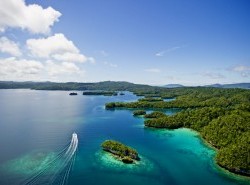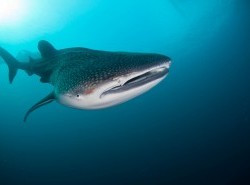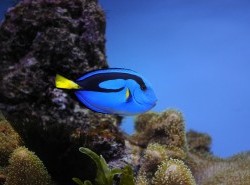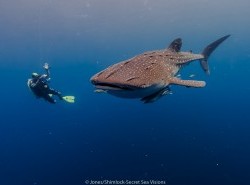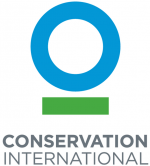Indonesian authorities just raided a major supplier of illegal marine megafauna in the remote Indonesian province of Maluku, discovering two illegally captured whale sharks which they released back into the wild. But there may be many more such cases in the Coral Triangle, as ocean theme parks in China and parts of Southeast Asia increase and seek out unique species to attract visitors. Award winning photojournalist Paul Hilton reports...
Indonesia's marine police head out to raid the marine species exporting business following a tip off about two illegally caught whale sharks
For many years, I’ve documented undersea life; capturing images of threatened species as they glide through vast expanses of ocean, oblivious to the fact they are prized and therefore mercilessly hunted by those at the top of the food chain. But on this day, I am on a very different assignment. There is no freedom here and for the whale shark that swims past me at speed, there is no escape either. This is a marine pen, housing two young sharks, on a small island in the Maluku Sea, Indonesia.
The small pen in which the two whale sharks - the world's biggest fish - were confined
Behind a heavy mesh enclosure, the environment here is devoid of all of the sights, sounds, and smells of the natural world. The smaller of the two sharks, moves towards me, its mouth agape, begging for food. Realising I don’t have what it wants, the shark languidly swims away to make yet another, monotonous lap of its prison.
My assignment is to cover the Wildlife Conservation Society (WCS)’s 18 month long investigation into the illegal trade of live marine megafauna from Indonesia to supply the world’s ocean theme parks. It’s a ground-breaking initiative involving Indonesia’s Ministry for Marine Affairs and Fisheries, Ambon and Labuan Lombok’s Fisheries, the Maritime Affairs Monitoring Taskforce, Maritime Patrol, and the Wildlife Crimes Unit (WCU) of the WCS.
Suspects are questioned by the police
The investigations have focused on where the animals are being illegally caught and then trafficked. It emerged that China and Southeast Asia are prime locations; in China alone there are 39 known ocean theme parks built or under construction; a booming industry whose tide shows no sign of stemming. The flagship facility is Chimelong Ocean Kingdom; a giant holiday resort featuring many of the great ocean species. Opening in 2014, Chimelong Ocean Kingdom is located in Zhuhai, Guangdong Province, just outside Macao in Southern China, and boasts the world’s largest aquarium. The marine park’s website advertises whale sharks as one of its major attractions, as well as dolphins and manta rays.
The China Cetacean Alliance (CCA), a coalition of international animal-protection groups reports that the facility houses 491 cetaceans, which include 279 bottlenose dolphins, 114 belugas, and nine killer whales. Most troubling is that number of exported wildlife to the centre is growing as animals die, due to lack of natural diet, and also depression. This implies yet more animals will need to be replaced, putting exponentially more pressure on dwindling wild populations.
One of two illegally captured whale sharks in the province of Maluku in far eastern Indonesia
Our investigation in Maluku was sparked in late 2014 by an undercover contact stating that he had witnessed a large oceanic manta ray being flown out of Ambon, Indonesia, by the airline Volga-Dnepr destined for Macao in China, with an apparently complete set of formal paperwork. The manta ray was destined for Zhuhai Chimelong Investment & Development Co., Ltd. However, Indonesia had declared whale sharks a protected species throughout its entire near 6 km square kilometer exclusive economic zone (EEZ) in 2013, and followed up with similar protection measures for manta rays in February 2014. The fact that exports were continuing implied support from at least some high-level authorities for this valuable, yet illegal, enterprise.
The suspects were licensed only to breed tropical fish like these ones
A year and a half later, the trail of this email led us to the Maluku marine farm. Arriving after dark, armed, and unannounced, our team comprising the Indonesian government law enforcement agencies and Wildlife Crimes Unit of WCS quickly went to work. Within minutes all staff members at the facility were sitting down in a line in front of us. The questioning began.
An employee there told us his boss had recommendation letters from the Indonesian government officials to collect and breed ornamental fish, while applications classifying the farm as a conservation institution was apparently being processed. Such status would allow the capture, breeding, and export of whale sharks, dolphins, and manta. The employee claimed that the program was part of a “government to government exchange” between Indonesia and China, and insisted that it was fully approved by the relevant authorities.
The sharks were both unharmed
However, the Ministry of Marine Affairs and Fisheries in Jakarta had no knowledge of this operation and no legal permits have yet been issued for export of whale sharks or any other live marine megafauna. Equally, there is no evidence that the Chinese authorities had issued legal import permits. At a press conference in Jakarta on Friday 27 May, the Minister of Maritime Affairs and Fisheries Susi Pudjiastuti was typically forthright and insisted that “There is no excuse for catching whale sharks as the species is fully protected under the 2013 law. This is conservation. It has rules. Nothing can legalize what they have done.”
The whale sharks as they were being released from their holding pen
Climbing into the pen with the sharks, I focus on their condition after three months in captivity. Documents revealed that the company purchasing the whale sharks, Pt Air Biru Maluku, also known as Blue Aquatic International, is a company part owned by a Singaporean-Chinese businessman and a mid-ranking Indonesian military officer. The same company is known to have legally exported manta rays to Singapore’s Resorts World Sentosa, owned by the Genting Group, one of Malaysia’s largest corporations, prior to the Indonesian government’s decision to protect the species.
The poachers of the two sharks were to receive 20 million rupiah or US$1,476 once they had been caught. Staff at Blue Aquatic told us it costs at least US$800 to catch and keep the sharks alive, which emphasized to me once again the never-ending unanswered question in this line of work: is it really worth it? At the time of writing, arrests are yet to be made, but the offenders will be charged under Indonesian Fisheries Law number 31/2004 which carries a maximum penalty of six years in prison, and fines of up to IDR 1.5 billion (approximately 115,000 USD).
A diver guides one of the whale sharks safely out of the sea pen
As I take another breath and dive down to take a few last photographs of the imprisoned sharks, the team prepare to release them back into the habitat they should never have left. The staff signal they are ready, and bait the water outside the net but the sharks won’t leave the enclosure. It is astounding that their instincts have already been so affected by their three months in captivity. The smaller of the two finally crosses the line, but then turns, to head back in. I’m always loathe to intervene in the natural world, but I fear the shark’s only chance to leave the confines of the holding pen will be lost if I do not. I apply pressure to its head, directing the six metre animal towards the open water. It dives down, finally outside of the net, disappearing into the blue. I miss the shot, but the shark is back where it belongs.
One of the whale sharks makes its way out of the net and back into the open ocean
I knew, however, the next shot was a “must get”. As I turned around, a diver was escorting the larger shark out, yet I managed to capture the image; a positive illustration that I truly hope will echo the need to protect this iconic species before they are lost from the world’s oceans forever.
Free at last
As I sit at home writing this piece following the Maluku experience, I’m driven to wonder at the insatiable human appetite to consume and use the world’s great marine creatures. Aquariums play a valuable role in the conservation of genetic material and linking people in cities to nature. However, aquariums and tourism parks also need to adopt responsible and legal behaviors in sourcing and importing animals, particularly threatened species. And governments have a duty to encourage social responsibility and to enforce laws and standards, as Indonesia is doing. With significant strides being made in China as to the protection of other animal species, we cannot say we didn’t know. In our 21st century world, with information at our fingertips, ignorance is just not an excuse.
Whale sharks are listed as vulnerable by the IUCN and protected under CITES
